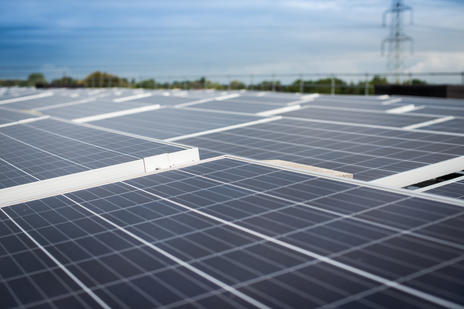Climate leadership in the pharmaceutical sector
With a target of achieving science-based net zero by 2045, pharmaceutical company AstraZeneca is leading the healthcare sector on climate action. Recognizing that the climate crisis is a healthcare crisis, the business’s plan is not to hit its ambitious greenhouse gas (GHG) emissions reduction targets in the easiest way permissible, but to choose the path that delivers the most positive impact possible for human and environmental health. That’s why 24/7 carbon-free electricity (CFE) is the latest step on its net zero journey, and why they have joined Climate Group’s latest initiative, the 24/7 Carbon-Free Coalition, as Founding Partners.
Net zero ambition
As long ago as 2015, AstraZeneca joined Climate Group’s RE100 campaign, a collective corporate pledge to transition to renewable energy. In 2020, the company launched its Ambition Zero Carbon strategy, followed by its industry-leading long-term net zero target and near-term GHG reduction goals in 2021: reduce GHG emissions from its global operations and fleet, for Scopes 1 and 2, by 98% by 2026, from a 2015 baseline, and halve its entire value chain footprint by 2030, from a 2019 baseline. By 2023, 95% of all electricity use across AstraZeneca’s operations, including self-generation, was from certified renewable sources, putting it on-track for its 2025 RE100 commitment.
Going beyond low-carbon energy certificates
With science underpinning everything AstraZeneca does, the company keeps abreast of the latest climate science to inform its approach to sustainability. That’s why its sustainability team was already investigating the provenance and timing of the company’s energy sources when early movers such as Google and Microsoft made public commitments to power their entire global operations on CFE on an hour-by-hour basis.
The AstraZeneca team was prioritising ‘additionality’ (new-to-grid renewables) in its renewable energy strategy but quickly realised that the transition away from fossil fuels means not just adding new renewables to the grid but improving their utilisation too. They concluded that genuine decarbonisation involves using only renewable energy from local sources that synchronise with local energy usage. Since 2022, the business has consequently been incorporating 24/7 CFE into its sustainability strategy – culminating in becoming a founding partner of Climate Group’s 24/7 CFE campaign.
"While organisations may be at varying stages of their energy transition, considering 24/7 CFE as their next step can be an impactful way to take climate action and accelerate renewable energy use. At AstraZeneca, we want to play a role in enabling the energy transition and a collective shift in corporate mindsets by demonstrating that 24/7 CFE is not only possible but brings many benefits.”
"While organisations may be at varying stages of their energy transition, considering 24/7 CFE as their next step can be an impactful way to take climate action and accelerate renewable energy use. At AstraZeneca, we want to play a role in enabling the energy transition and a collective shift in corporate mindsets by demonstrating that 24/7 CFE is not only possible but brings many benefits.”

A 24/7 CFE journey
With its global footprint, AstraZeneca wants to demonstrate to others in the health sector and beyond that companies can benefit from matching their electricity demand with supply in terms of both when and where it’s generated. The business is also keen to show others how the transition to 24/7 CFE works in practice.
The first step is to reduce overall energy demand. The next is to substitute fossil fuels with local renewables. Where possible, these should be ‘new-to-grid’ renewables – like the building of a new wind or solar farm.
Self-generated power
AstraZeneca aims for more than half of its total site’s energy (electricity and fuels) to come from ‘new to grid’ energy sources by the end of 2025, which means it’s supporting an array of new renewable energy plants around the world. Most recently, it signed a power purchase agreement (PPA) in Sweden that means three new wind farms will supply it with 200 gigawatt-hours of carbon-free electricity per year for ten years – corresponding to 80% of its total electricity needs - at its research facility in Gothenburg and manufacturing facility in Södertälje. Meanwhile, the company is also actively looking at similar PPAs in its two other key electricity consuming markets, the UK and the US.
Resilience in a changing world
The AstraZeneca leadership team view the move to 24/7 CFE not just as the responsible thing to do, but also as good risk management, because it’s set to become business-as-usual within a few years. They recommend embedding it in energy purchases now to make sure that long-term agreements are resilient in a changing world.
For further information about Climate Group’s 24/7 CFE campaign, please sign up to our newsletter.

895c.jpg?itok=3tLSZ46V)
